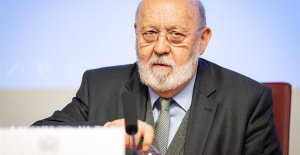The Bank of Spain asks to take advantage of European funds and promote policies that increase competition in the service sector
MADRID, 21 Jul. (EUROPA PRESS) -
The Bank of Spain indicates that the relative weight of Spanish exports of non-tourism services over GDP remains below that observed in the euro area and its main economies, with the exception of Italy, and considers that there is "a significant margin of upward travel".
All this taking into account that the accumulated growth of real exports of non-tourism services between 2020 and 2022 amounted to practically 50%, so that, in 2022, these were close to 20% above the 2019 level.
According to the Bank of Spain, the path of expansion of exports of non-tourism services over the last decades has continued after the setback registered during the health crisis, resulting in a greater weight in GDP, which has gone from 2.4% in 1995 to 6.8% in 2022.
"However, this contribution still remains below the percentages it reaches in countries such as Germany and France," warns in a report published this Friday.
Looking to the future, the Banco de España considers that various structural factors of a global nature could support a continuation of the high dynamism of exports of non-tourism services, such as the growing digitization of the productive fabric, technological innovations and the expansion of professional services.
In addition, in the case of Spanish exports, an additional growth margin can be expected, as shown by the comparison with the main euro area core economies, in which the share of non-tourism services exports in GDP and in global trade is significantly higher than in the country.
The Bank of Spain has ensured that the high dynamism of exports of non-tourism services after the pandemic has contributed significantly to the recovery of the Spanish economy.
This reactivation has been mainly supported by sales -particularly to the EMU and North America- of business, transport and technological services (intellectual property rights and telecommunications, computing and information). This dynamism has been favored, in a context of wage moderation, by the competitive capacity of a core of large exporting companies that usually belong to multinational, Spanish or foreign groups.
According to the organization headed by Pablo Hernández de Cos, the competitive capacity of large exporting companies in Spain, which usually belong to business groups, could explain, at least in part, the high dynamism of exports of non-tourism services after the pandemic.
In this sense, the Bank of Spain has insisted that the Recovery, Transformation and Resilience Plan (PRTR), linked to the European Next Generation EU (NGEU) programme, represents an opportunity to promote high value-added services associated with research and new technologies, due to its emphasis on the challenge of digitalisation, as long as its design and application are appropriate.
In addition, experts point out that the benefits associated with these investments would be enhanced if they are accompanied by the adoption of policies that increase competition in the services sector, which, in turn, would stimulate improvements in their quality, with the consequent increase in competitive capacity abroad.
On the other hand, the Bank of Spain has warned that the international context raises uncertainties about the evolution of international transactions of non-tourism services.
These risks are associated with growing geopolitical tensions and the possible regionalization of global value chains, the net impact of which is uncertain, since, on the one hand, they may limit the expansion of non-tourism service transactions outside the EU (which currently account for around half of Spanish exports), particularly in some Asian countries, while, on the other, they may strengthen ties within the EU.

 Exploring Cardano: Inner Workings and Advantages of this Cryptocurrency
Exploring Cardano: Inner Workings and Advantages of this Cryptocurrency Seville.- Economy.- Innova.- STSA inaugurates its new painting and sealing hangar in San Pablo, for 18 million
Seville.- Economy.- Innova.- STSA inaugurates its new painting and sealing hangar in San Pablo, for 18 million Innova.- More than 300 volunteers join the Andalucía Compromiso Digital network in one month to facilitate access to ICT
Innova.- More than 300 volunteers join the Andalucía Compromiso Digital network in one month to facilitate access to ICT Innova.-AMP.- Ayesa acquires 51% of Sadiel, which will create new technological engineering products and expand markets
Innova.-AMP.- Ayesa acquires 51% of Sadiel, which will create new technological engineering products and expand markets Puigdemont sees it possible to be invested in the second round and will not agree with PSC, PP, Vox or AC
Puigdemont sees it possible to be invested in the second round and will not agree with PSC, PP, Vox or AC The PP sees the concentration of support for Sánchez in Ferraz as a "failure" and believes that it "complicates" the story of its continuity
The PP sees the concentration of support for Sánchez in Ferraz as a "failure" and believes that it "complicates" the story of its continuity Marc Márquez returns to pole in Jerez
Marc Márquez returns to pole in Jerez The CIS carries out a quick survey on Sánchez's letter to measure the reaction of citizens
The CIS carries out a quick survey on Sánchez's letter to measure the reaction of citizens How Blockchain in being used to shape the future
How Blockchain in being used to shape the future Not just BTC and ETH: Here Are Some More Interesting Coins Worth Focusing on
Not just BTC and ETH: Here Are Some More Interesting Coins Worth Focusing on UPV students build a prototype of a wooden house to move to Equatorial Guinea
UPV students build a prototype of a wooden house to move to Equatorial Guinea The UA opens the call for the Impulso 2024 Awards for the best innovative business initiatives
The UA opens the call for the Impulso 2024 Awards for the best innovative business initiatives ALI, virtual assistant from Alicante, internationally recognized by the OECD
ALI, virtual assistant from Alicante, internationally recognized by the OECD Retrópolis brings the golden age of video games and computing to the UPV
Retrópolis brings the golden age of video games and computing to the UPV A million people demonstrate in France against Macron's pension reform
A million people demonstrate in France against Macron's pension reform Russia launches several missiles against "critical infrastructure" in the city of Zaporizhia
Russia launches several missiles against "critical infrastructure" in the city of Zaporizhia A "procession" remembers the dead of the Calabria shipwreck as bodies continue to wash up on the shore
A "procession" remembers the dead of the Calabria shipwreck as bodies continue to wash up on the shore Prison sentences handed down for three prominent Hong Kong pro-democracy activists
Prison sentences handed down for three prominent Hong Kong pro-democracy activists ETH continues to leave trading platforms, Ethereum balance on exchanges lowest in 3 years
ETH continues to leave trading platforms, Ethereum balance on exchanges lowest in 3 years Investors invest $450 million in Consensys, Ethereum incubator now valued at $7 billion
Investors invest $450 million in Consensys, Ethereum incubator now valued at $7 billion Alchemy Integrates Ethereum L2 Product Starknet to Enhance Web3 Scalability at a Price 100x Lower Than L1 Fees
Alchemy Integrates Ethereum L2 Product Starknet to Enhance Web3 Scalability at a Price 100x Lower Than L1 Fees Mining Report: Bitcoin's Electricity Consumption Declines by 25% in Q1 2022
Mining Report: Bitcoin's Electricity Consumption Declines by 25% in Q1 2022 Oil-to-Bitcoin Mining Firm Crusoe Energy Systems Raised $505 Million
Oil-to-Bitcoin Mining Firm Crusoe Energy Systems Raised $505 Million Microbt reveals the latest Bitcoin mining rigs -- Machines produce up to 126 TH/s with custom 5nm chip design
Microbt reveals the latest Bitcoin mining rigs -- Machines produce up to 126 TH/s with custom 5nm chip design Bitcoin's Mining Difficulty Hits a Lifetime High, With More Than 90% of BTC Supply Issued
Bitcoin's Mining Difficulty Hits a Lifetime High, With More Than 90% of BTC Supply Issued The Biggest Movers are Near, EOS, and RUNE during Friday's Selloff
The Biggest Movers are Near, EOS, and RUNE during Friday's Selloff Global Markets Spooked by a Hawkish Fed and Covid, Stocks and Crypto Gain After Musk Buys Twitter
Global Markets Spooked by a Hawkish Fed and Covid, Stocks and Crypto Gain After Musk Buys Twitter Bitso to offset carbon emissions from the Trading Platform's ERC20, ETH, and BTC Transactions
Bitso to offset carbon emissions from the Trading Platform's ERC20, ETH, and BTC Transactions Draftkings Announces 2022 College Hoops NFT Selection for March Madness
Draftkings Announces 2022 College Hoops NFT Selection for March Madness























